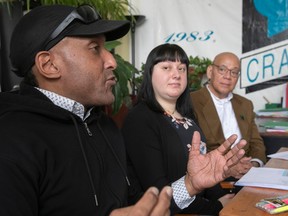The study looked at more than 100 decisions by criminal, penal, civil and administrative courts between 2016 and 2021.

Quebecers who file official complaints about racial profiling often face major roadblocks to justice and reparation, a new study shows.
Many complaints are dogged by procedure wrangling, excessive delays, low damages for human rights cases or modest disciplinary sanctions against police officers for misconduct — resulting in insufficient reparations for victims of racial profiling, the authors say.
Sign up to receive daily headline news from the Montreal Gazette, a division of Postmedia Network Inc.
Thanks for signing up!
A welcome email is on its way. If you don't see it, please check your junk folder.
The next issue of Montreal Gazette Headline News will soon be in your inbox.
The study, the first of its kind in Quebec, looked at more than 100 decisions by criminal, penal, civil and administrative courts between 2016 and 2021.
A preliminary review of the data raises questions about access to justice for victims, according to researchers with the Institute for Research and Education on Race Relations (IRERR).
The preliminary results focused on 25 racial-profiling decisions from the Quebec Human Rights Tribunal and 13 from the Quebec Police Ethics Committee affecting 36 victims, almost all Black males.
All complaints involve the police.
The study shows that victims often have to wait for years to have their cases heard. Here are some of the findings:
— Excessive delays: it took an average of five to seven years for a complaint to the Human Rights Commission to be brought to the Human Rights Tribunal and for a final decision to be rendered. The worst case involved an 88-month delay, which the tribunal eventually dismissed because of excessive delays.
— For police ethics cases, it took an average of three years for a complaint to reach the Quebec police ethics committee.
— Insufficient damages for civil rights violations: Of the three successful Human Rights Tribunal decisions, moral damages in each ranged from $8,000 to $15,000, while punitive damages against the officers ranged from $1,000 to $2,500.
— Only three of the 13 police ethics committee decisions led to sanctions against the officers for racial profiling.
Almost all decisions with sanctions are appealed by the officers.
“We too often focus only on police interactions with citizens, but today’s data should encourage us to expand our focus on what happens to victims when they try to take legal actions against racial profiling,” said Stéphane Thalès, a project co-ordinator with the IRERR.
Of the 36 victims, 89 per cent were Black adults. Anglophones make up about 56 per cent of the victims. This is probably because many English-speaking Blacks have been in Quebec for two or three generations and are more likely to know their rights and are less fearful of confronting authority, said Fo Niemi, executive director of Research Action on Race Relations (CRARR).
About 55 per cent of the 27 incidents in the study are driving-while-Black cases.
In November, the Quebec government said it is planning to appeal a recent court ruling that struck down random police checks. The ruling was made on the grounds the practice facilitated racial profiling.
The study also examined the profile of judges in the 38 human rights tribunal cases and Quebec Police Ethics Committee decisions. Of the 15 judges involved in both tribunals (eight males and seven females), only one is racialized.
IRERR’s online survey on racial profiling involving 160 participants also provides concerning data on victims’ reactions after encountering racial profiling. Of the 122 respondents who experienced profiling, 77.9 per cent did not report or act on it, most citing as reasons the reluctance to deal with authorities (23.4 per cent) and the justice system (20.7 per cent), the perception of inadequate punishment (19.9 per cent) and the lack of information on recourses (14.9 per cent.)
“These preliminary results confirm the existence of major challenges for victims of racial profiling when it comes to access to justice and reparation, at every step of the legal process,” said Kathleen Barera, a complaints officer with CRARR.
The study also looked at the profile of judges in the 38 cases studied. Of the 15 judges involved, only one is racialized.
Preliminary results were released Wednesday to mark this year’s Black History Month. Full results will be available in March.
The study was funded by an anti-racism program of the Canadian Heritage department.
kwilton@postmedia.com
-

Hanes: Quebec's appeal of racial profiling judgment out of step with the times
-

Racial profiling complaint by Montrealer is a first in Quebec: group


